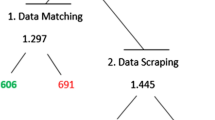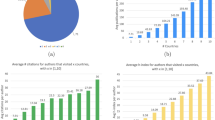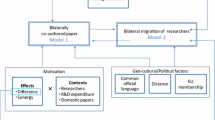Abstract
This study introduces a new bibliometric approach to study the effects of international scientific mobility on knowledge transfer. It is based on an analysis of internationally mobile and non-internationally mobile German scientists publishing in journals that are indexed in Scopus. Using bibliometric data such co-authored articles, references and lexical abstract terms from the Scopus database, a method is presented that is based on cosine similarity to measure the similarity of the knowledge base of authors and their co-authors. This quantifiable method is capable of revealing potential knowledge transfer between internationally mobile scientists and different types of co-authors. In addition, the Shannon index is used as a diversity measure to analyse the knowledge base of scientists. Analyses are presented for an overall 9-year publication period (2007–2015), split into a pre-mobility phase, a mobility phase and a post-mobility phase, each of which lasts for 3 years. Internationally mobile scientists are compared with non-internationally mobile scientists and the potentials and limitations of the method presented are discussed. It is concluded that the bibliometric approach proposed is useful when applied on a large scale. International mobility proves to benefit the exchange of knowledge between scientists and various types of co-authors.











Similar content being viewed by others
Notes
Competence Centre for Bibliometrics. http://www.forschungsinfo.de/Bibliometrie/en/index.php?id=home.
The algorithm aims at higher levels of precision than recall. Thus, as soon as a publication cannot be assigned to an existing author ID, a new profile will be created under which the publication appears. The algorithm is supplemented by an author feedback system where an author can indicate whether publications are wrongly attributed to his profile.
Scientists under study are not German by nationality but by publishing mainly from German institutions in 2007–2015.
References
Ackers, L. (2005). Moving people and knowledge: Scientific mobility in the European Union. International Migration, 43(5), 99–129.
Ackers, L. (2008). Internationalisation, mobility and metrics: A new form of indirect discrimination? Minerva, 46(4), 411–435. https://doi.org/10.1007/s11024-008-9110-2.
Aman, V. (2017). Does the Scopus author ID suffice to track scientific international mobility? A case study based on Leibniz laureates. Presented at the 22th Conference on science, technology & innovation indicators (STI 2017), ESIEE, Paris.
Aman, V. (2017). A new bibliometric approach to measure knowledge transfer of internationally mobile scientists, In: Proceedings of ISSI 2017—The 16th international conference on scientometrics and informetrics (pp. 1480–1490). Wuhan University, China.
Cañibano, C., Otamendi, J., & Andújar, I. (2008). Measuring and assessing researcher mobility from CV analysis: The case of the Ramón y Cajal programme in Spain. Research Evaluation, 17(1), 17–31. https://doi.org/10.3152/095820208X292797.
Collins, H. M. (1974). The TEA set: Tacit knowledge and scientific networks. Science Studies, 4, 165–186.
Collins, H. M. (2001). Tacit knowledge, trust and the Q of sapphire. Social Studies of Science, 31(1), 71–85. https://doi.org/10.1177/030631201031001004.
Conchi, S., & Michels, C. (2014). Scientific mobility: An analysis of Germany, Austria, France and Great Britain. Fraunhofer ISI Discussion Papers Innovation Systems and Policy Analysis. https://www.isi.fraunhofer.de/content/dam/isi/dokumente/ccp/innovation-systems-policy-analysis/2014/discussionpaper_41_2014.pdf. Accessed 19 July 2018.
Costigliola, V. (2011). Mobility of medical doctors in cross-border healthcare. The EPMA Journal, 2(4), 333. https://doi.org/10.1007/s13167-011-0133-7.
Fleming, L. (2001). Recombinant uncertainty in technological search. Management Science, 47(1), 117–132.
Gao, X., Guan, J., & Rousseau, R. (2011). Mapping collaborative knowledge production in China using patent co-inventorship. Scientometrics, 88(2), 343–362.
Glänzel, W. (2012). Bibliometric methods for detecting and analysing emerging research topics. El profesional de la Información, 21(2), 194–201.
Glänzel, W., Heeffer, S., & Thijs, B. (2017). Lexical analysis of scientific publications for nano-level scientometrics. Scientometrics, 111(3), 1897–1906. https://doi.org/10.1007/s11192-017-2336-8.
Gläser, J. (2003). What internet use does and does not change in scientific communities. Science Studies, 16(1), 38–51.
Gläser, J. (2006). Wissenschaftliche Produktionsgemeinschaften. Die soziale Ordnung der Forschung. Frankfurt/New York: Campus.
Gläser, J., & Laudel, G. (2001). Integrating scientometric indicators into sociological studies: Methodical and methodological problems. Scientometrics, 52(2), 414–434.
Jonkers, K., & Tijssen, R. (2008). Chinese researchers returning home: Impacts of international mobility on research collaboration and scientific productivity. Scientometrics, 77(2), 309–333.
Katz, J. S., & Martin, B. R. (1997). What is research collaboration? Research Policy, 26(1), 1–18. https://doi.org/10.1016/S0048-7333(96)00917-1.
Kawashima, H., & Tomizawa, H. (2015). Accuracy evaluation of Scopus Author ID based on the largest funding database in Japan. Scientometrics, 103(3), 1061–1071. https://doi.org/10.1007/s11192-015-1580-z.
Laudel, G. (2001). Collaboration, creativity and rewards: Why and how scientists collaborate. International Journal of Technology Management, 22(7/8), 762–780.
Laudel, G. (2002). Collaboration and reward. What do we measure by co-authorships? Research Evaluation, 11(1), 3–15. https://doi.org/10.3152/147154402781776961.
Laudel, G. (2003). Studying the brain drain: Can bibliometric methods help? Scientometrics, 57(2), 215–237. https://doi.org/10.1023/A:1024137718393.
Luukkonen, T., Tijssen, R. J. W., Persson, O., & Sivertsen, G. (1993). The measurement of international scientific collaboration. Scientometrics, 28(1), 15–36. https://doi.org/10.1007/BF02016282.
Moed, H. F., Aisati, M., & Plume, A. (2013). Studying scientific migration in Scopus. Scientometrics, 94, 929–942. https://doi.org/10.1007/s11192-012-0783-9.
Polanyi, M. (1962). The republic of science: Its political and economic theory. Minerva, 1, 54–73.
Ponomariov, B., & Boardman, C. (2016). What is co-authorship? Scientometrics, 109(3), 1939–1963.
Salton, G., & McGill, M. J. (1983). Introduction to modern information retrieval. Auckland: McGraw-Hill.
Shannon, C. E. (1948). A mathematical theory of communication. Bell System Technical Journal, 27(3), 379–423. https://doi.org/10.1002/j.1538-7305.1948.tb01338.x.
Wagner, C. S., & Leydesdorff, L. (2005). Network structure, self-organization, and the growth of international collaboration in science. Research Policy, 34, 1608–1618.
Winterhager, M., Schwechheimer, H., & Rimmert, C. (2014). Institutionenkodierung als Grundlage für bibliometrische Indikatoren. Bibliometrie - Praxis und Forschung, 3(14), 1–22.
Zucker, L. G., Darby, M. R., Furner, J., Liu, R. C., & Ma, H. (2007). Minerva unbound: Knowledge stocks, knowledge flows and new knowledge production. Research Policy, 36(6), 850–863. https://doi.org/10.1016/j.respol.2007.02.007.
Acknowledgements
The present study is an extended version of an article presented at the 16th International Conference on Scientometrics and Informetrics, Wuhan (China), 16–20 October 2017. The study was funded by the Bundesministerium für Bildung und Forschung (BMBF) under the Grant Number 01PQ16002. The data builds on the bibliometric database provided by the Competence Centre for Bibliometrics (Grant Number: 01PQ17001). I would like to thank Jochen Gläser and Nicolai Netz for their valuable comments during the genesis of the paper. I would also like to thank two anonymous reviewers for their comments, which have helped to improve the paper substantially.
Author information
Authors and Affiliations
Corresponding author
Rights and permissions
About this article
Cite this article
Aman, V. A new bibliometric approach to measure knowledge transfer of internationally mobile scientists. Scientometrics 117, 227–247 (2018). https://doi.org/10.1007/s11192-018-2864-x
Received:
Published:
Issue Date:
DOI: https://doi.org/10.1007/s11192-018-2864-x




